The Seven Archangels
Brian G. Chilton, M.Div., Ph.D. | September 1, 2024
Preparing for an episode of the Bellator Christi Podcast, I dove into angelology—that is, the study of angels. One of the fascinating topics I’ve been researching is on the archangels. Archangels are understood to be angels who oversee the operation of other angels under their charge.
Scripture implies that there are seven archangels. In Revelation 1:4, 20, 3:1, and 8:2, along with Isaiah 63:9, the writers of Scripture suggest the sevenfold order of the archangels.
Revelation 1:20
In Revelation 1:20, Jesus says, “The mystery of the seven stars you saw in my right hand and of the seven golden lampstands is this: The seven stars are the angels of the seven churches, and the seven lampstands are the seven churches” (Rev. 1:20).[1] Granted, some believe these seven angels represent seven particular angels who oversaw the seven churches of Revelation. However, others suggest that this could point to seven archangels overseeing the church and God’s creation.
Revelation 1:4 and 3:1
Both Revelation 1:4 and Revelation 3:1 speak of seven stars along with seven spirits. More directly, Jesus said in the text, “Write to the angel of the church of Sardis: Thus says the one who has the seven spirits of God and the seven stars: I know your works; you have a reputation for being alive, but you are dead” (Rev. 3:1). A powerful indictment, indeed! Nonetheless, here again, seven stars, representing angels, are shown to stand by the seven spirits (the Holy Spirit) at the throne of God. Thus, this text seems to suggest that these seven stars could be the seven archangels of God.
Revelation 8:2
Perhaps, Revelation 8:2 offers the strongest case for the existence of seven archangels. John said, “Then I saw the seven angels who stand in the presence of God; seven trumpets were given to them” (Rev. 8:2). These seven archangels are given trumpets to signify the seven judgments that will accompany seven trumpet blasts. This text coincides with Jewish literature that suggests that seven archangels stand before the presence of God (Tobit 12:15; 1 Enoch 20:1-7; 9:1; 40:9).
Who are these archangels? What do we know about them? Unfortunately, we do not have a lot of information about most of these archangels. However, many Christian traditions have suggested the identities of the seven. Anglicans, Catholics, and Eastern Orthodox traditions accept four of the archangels with relative assurance. Some traditions speak of the identity of the other three. However, for our purposes, we must gauge their identities with three levels of certitude.
Certain Identities:
The archangels whose identities can be known with certainty are those found in the canon of Scripture. We will ascribe a designation of 100% certainty to these angels. Two angels fit this designation.
Probable Identities:
Some archangels are recognized by Jewish literature, but they are not necessarily found in the pages of Scripture. Since these books were widely known and read by the people of the early Christian movement and seeing that many Christian traditions accept the identities of these angels, a probable designation of 75% certitude is ascribed to the angels of this category. This list contains two angels.
Questionable Identities:
Some archangels are known through apocalyptic literature that flows from around the time of the New Testament era. A few Christian denominations and popular traditions accept the identity of these remaining angels. Because we do not have a firm grasp on the angels of this category, a designation of questionable indicating a certitude of around 51% is given to these angels. This category consists of three angels.
The Archangels Who Are Certainly Known
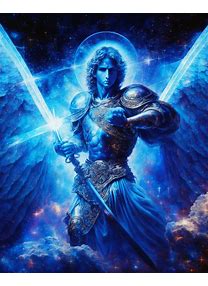 Archangel Michael:
Archangel Michael:
Michael is listed in various Scriptures and is accepted universally as an archangel. His name means “Who is like God?” One can learn about Michael in Daniel 10:13, 21, 12:1; Jude 9; and Revelation 12:7.
In Daniel 10:13, Michael came to the assistance of Daniel after he had been left with the kings of Persia. Michael is also shown to be the only one who had the courage to fight the spiritual powers of the princes of Persia (Dan. 10:21). Thus, Michael is shown to be a heroic and courageous angelic being. In Daniel 12:1, the prophet shows that the archangel Michael is a great prince and defender of God’s people who “stands watch” (Dan. 12:1). He is also associated with the escape of God’s people from the time of tribulation.
The NT also mentions the archangel Michael. Michael is shown to be an angelic being of great character. In a bizarre story told only by Jude in the Bible, Michael disputed with Lucifer about what to do with the body of Moses. However, Jude notes that even though Michael was courageous enough to stand against the devil, he did not “dare to utter a slanderous condemnation against him but said, ‘The Lord rebuke you!’” (Jude 9).
In the book of Revelation, Michael led a charge with his angels against Lucifer and his demons. Lucifer and a third of heaven were cast out of heaven because they betrayed God. Michael and his host threw Lucifer and his demons to earth after a solid victory over the powers of darkness. Furthermore, Michael protected Mary, the young Jesus, and the people of God. Through all of this, one sees that Michael is a great defender and protector of God’s people.
Archangel Gabriel:
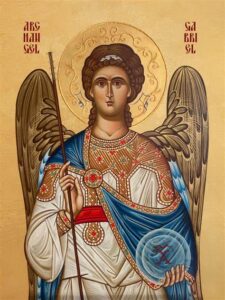 While he isn’t necessarily listed as an archangel, Gabriel is classically identified as one. Gabriel is God’s messenger who delivers news of utmost importance. Gabriel’s name means “Strength of God,” “Hero of God,” or “God has shown Himself Mightily.”
While he isn’t necessarily listed as an archangel, Gabriel is classically identified as one. Gabriel is God’s messenger who delivers news of utmost importance. Gabriel’s name means “Strength of God,” “Hero of God,” or “God has shown Himself Mightily.”
Gabriel appears numerous times in the biblical text. Gabriel appeared to Daniel to explain a vision that the prophet received from God (Dan. 8:16). Gabriel was said to have had a humanlike appearance, although he was a divine angel of God. Additionally, Gabriel reappeared to Daniel to explain a vision. Daniel had been in prayer for a lengthy period. Gabriel then described what was the 70 Weeks prophecy, one of the most powerful prophecies in the OT (Dan. 9:20–27).
Like Michael, Gabriel reappears in the NT. He announced the birth of John the Baptist to the priest Zacharias (Lk. 1:19). Gabriel appeared again when he announced the birth of Jesus to the Virgin Mary (Lk. 1:26). Some hold that Gabriel may have been the angel who encouraged Joseph to marry Mary (Matt. 1–2).
From what the Bible tells us, Gabriel is the herald of God. He is God’s messenger. Some believe that Gabriel may be the archangel who blows the trumpet to signify Jesus’s return.
Since both these archangels are solidly found in the pages of Scripture, Michael and Gabriel’s position as archangels is fairly straightforward. For that reason, Michael and Gabriel’s designation as two of the seven archangels is fairly certain.
The Archangels Who Are Probably Known
Archangel Raphael:
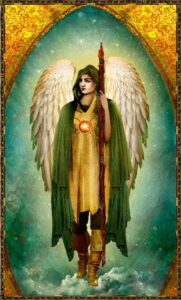 Raphael—not the ninja turtle—is not mentioned in Scripture. However, he does appear in the Apocrypha. Raphael is found throughout the book of Tobit (Tobit 1:1; 3:17; 5:4, 16; 6:11, 14, 16, 18; 7:9; 8:2–3; 9:1, 5; 11:1, 4, 7; 12:6, 15). He guides Tobit through some difficult times, offering instruction, and even making sacrifices along the way. At the end the book, Raphael identifies himself as one of the seven archangels, saying, “I am Raphael, one of the seven angels who stand ready and enter before the glory of the Lord” (Tobit 12:15).[2] Raphael is also mentioned in 1 Enoch and is said to be over the spirits of mankind (1 Enoch 20:4). According to the Babylonian Talmud, Raphael is one of the three angels who met with Abraham.[3]
Raphael—not the ninja turtle—is not mentioned in Scripture. However, he does appear in the Apocrypha. Raphael is found throughout the book of Tobit (Tobit 1:1; 3:17; 5:4, 16; 6:11, 14, 16, 18; 7:9; 8:2–3; 9:1, 5; 11:1, 4, 7; 12:6, 15). He guides Tobit through some difficult times, offering instruction, and even making sacrifices along the way. At the end the book, Raphael identifies himself as one of the seven archangels, saying, “I am Raphael, one of the seven angels who stand ready and enter before the glory of the Lord” (Tobit 12:15).[2] Raphael is also mentioned in 1 Enoch and is said to be over the spirits of mankind (1 Enoch 20:4). According to the Babylonian Talmud, Raphael is one of the three angels who met with Abraham.[3]
Raphel’s name means “Healing power of God.” For this reason, many Christian traditions suggest that Raphael is the archangel of healing. Some think that John may allude to the archangel Raphael when he speaks of the angel who stirred the water in the Pool of Bethsaida (Jn. 5:2–4).
Archangel Uriel:
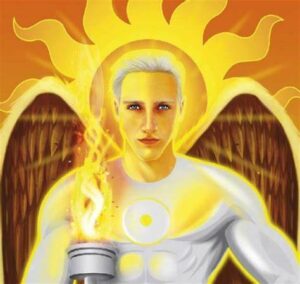 Uriel’s name means “Fire of God” or “God is my Light.” Many traditions believe that Uriel is the angel of repentance and guards the gates of hell. If true, Uriel must be an angel of immeasurable strength since he keeps the powers of hell under lock and key. Some traditions hold that Uriel is an angel of truth and judges falsehood. Like Raphael, Uriel’s name is not found in the pages of Scripture.
Uriel’s name means “Fire of God” or “God is my Light.” Many traditions believe that Uriel is the angel of repentance and guards the gates of hell. If true, Uriel must be an angel of immeasurable strength since he keeps the powers of hell under lock and key. Some traditions hold that Uriel is an angel of truth and judges falsehood. Like Raphael, Uriel’s name is not found in the pages of Scripture.
However, he does appear in 2 Esdras, a book in the Apocrypha. Uriel explains the limitations of human understanding when it comes to God. He said, “Your understanding has utterly failed regarding this world, and do you think that you can comprehend the way of the Most High?” (2 Esdras 4:1). The angel appeared to Ezra again after the prophet fasted for seven days as the angel had commanded. Uriel scolded Ezra because he appeared to be more concerned with his nation than he was with the ways of God (2 Esdras 5:20, 33). The angel later interprets a vision that the prophet received in 2 Esdras 10:28–59.
In 1 Enoch, the writer describes Uriel as the angel who is over the world and Tartarus (i.e., hell). The angel leads Enoch through the underworld, explaining its secrets (1 Enoch 19:1; 21:5–6; 27:2; 33:3–4; 72:1; 74:2; 75:3–4; 78:10; 80:1; and 82:7).
For both these angels, we do not have the support that Michael and Gabriel hold. Nonetheless, various texts, some that are accepted by various Christian groups (i.e., sectors of Anglicanism, Roman Catholics, and Eastern Orthodox) do identify them as archangels. Because of that, we will give Raphael and Uriel’s designation as archangels as probable.
The Archangels Who Are Questionably Known
 Archangel Saraqael:
Archangel Saraqael:
Saraquel is also known as Zerachiel, Barachiel, or Sariel. The name means “God’s command.” Saraqael is not found in the pages of Scripture, the Apocrypha, or other mainline sources. However, Saraqael is listed in 1 Enoch as one of the seven archangels (1 Enoch 20:6). Saraqael is listed as the archangel who is over the spirits of those who are in sin. As such, many traditions revere this angel as one who is over the execution of God’s judgment.
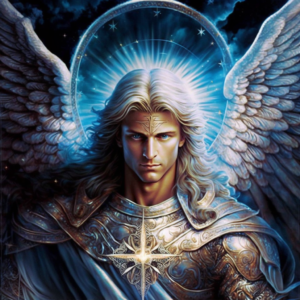 Archangel Raguel:
Archangel Raguel:
Raguel’s name means “Friend of God.” Many traditions accredit him as the angel of justice, equality, and fairness. Like Saraquel, Raguel’s identity is only found in apocryphal sources. In 1 Enoch, Raguel is said to “take vengeance on the world of the luminaries” (1 Enoch 20:4).[4] If true, then Raguel would, at least in some sense, oversee the judgment of demons.
Archangel Remiel:
 Remiel is also known as Jerahmeel, Jehudiel, or Jeremiel. The name Remiel means “Thunder of God,” “Mercy of God,” and “Compassion of God.” Many traditions maintain that Remiel is the angel of hope and faith. According to 1 Enoch, Remiel is the one God set “over those who rise” (1 Enoch 20:8). If true, Remiel could be involved with the resurrection of the saints.
Remiel is also known as Jerahmeel, Jehudiel, or Jeremiel. The name Remiel means “Thunder of God,” “Mercy of God,” and “Compassion of God.” Many traditions maintain that Remiel is the angel of hope and faith. According to 1 Enoch, Remiel is the one God set “over those who rise” (1 Enoch 20:8). If true, Remiel could be involved with the resurrection of the saints.
As one can tell, our knowledge of the archangels Saraquel, Raguel, and Remiel is scant. Remember, they are only known through apocalyptic and non-biblical texts. Therefore, we cannot place a great deal of trust in what we know about them. Even still, since the Eastern Orthodox Church and other religious denominations accept them as potential archangels, we cannot dismiss them entirely. Therefore, it would be wise to list one’s understanding of Saraquel, Raguel, and Remiel as questionable at best.
Conclusion: What We Learn about God Through the Angelic Orders
When studying angels, I found myself asking, “Why did God need to create all these angels?” If God is omnipotent, omniscient, and omnipresent, then God could do it all Himself without the use of angels. Then, it dawned on me that the same is true of God’s use of human beings. God does not have to use us for ministry. Rather, He chooses to. Likewise, God created archangels and the angelic host of heaven and uses them to give the angels a sense of meaning, purpose, and value. The same is true for us, too.
In other words, God’s use of angels and human beings is relational at its core. The God Who spoke the universe into being from simply a word needs no one or nothing. God is totally self-sufficient. The name Yahweh/Jehovah means just that (“I AM What I AM”). However, God’s loving nature evoked the desire to have a relationship with all the beings He creates. If you don’t have a relationship with this holy God, it is my prayer that you will begin a relationship soon with the One who gives all things meaning. And remember, while it is tempting to look in awe at these angelic beings, and rightfully so, don’t forget that God is the One Who created all of them. Thus, God’s power is limitless, and His wisdom is incomprehensible. Lest we forget, God is the only One Who deserves to be worshiped.
About the Author
Brian G. Chilton, M.Div., Ph.D.

Brian G. Chilton is the founder of Bellator Christi Ministries and the co-host of the Bellator Christi Podcast. Dr. Chilton earned a Ph.D. in Theology and Apologetics at Liberty University (with high distinction), an M.Div. in Theology from Liberty University (with high distinction); his B.S. in Religious Studies and Philosophy from Gardner-Webb University (with honors); earned a Certificate in Christian Apologetics from Biola University, and completed Unit 1 of Clinical Pastoral Education at Wake Forest University’s School of Medicine.
Dr. Chilton is a member of the Evangelical Theological Society and the Evangelical Philosophical Society. In his spare time, he enjoys reading, working out in his home gym, and watching football. He has served in pastoral ministry for over 20 years, works as a clinical hospice chaplain, and is an Adjunct Professor of Apologetics at Carolina College of Biblical Studies (https://www.CCBS.edu). Recently, Dr. Chilton became the Editor-in-Chief of Acquisitions for Illative House Press (https://illativehousepress.com).
https://www.amazon.com/Laymans-Manual-Christian-Apologetics-Essentials/dp/1532697104
https://www.amazon.com/Conversations-about-Heaven-Difficult-Questions/dp/1666762687
Notes
[1] Unless otherwise noted, all quoted Scripture comes from the Christian Standard Bible (Nashville: Holman, 2020).
[2] Quotations from the Apocrypha come from the New Revised Standard Version: Updated Edition (Nashville: Friendship Press, 2021).
[3] John D. Barry, David Bomar, Derek R. Brown, et. al., eds., Lexham Bible Dictionary (Bellingham, WA: Lexham Press, 2016), Logos Bible Software.
[4] Quotations from 1 Enoch come from Robert Henry Charles, ed., “1 Enoch,” Pseudepigrapha of the Old Testament, vol. 2 (Oxford: Clarendon Press, 1913), 201.
© 2024. Bellator Christi.

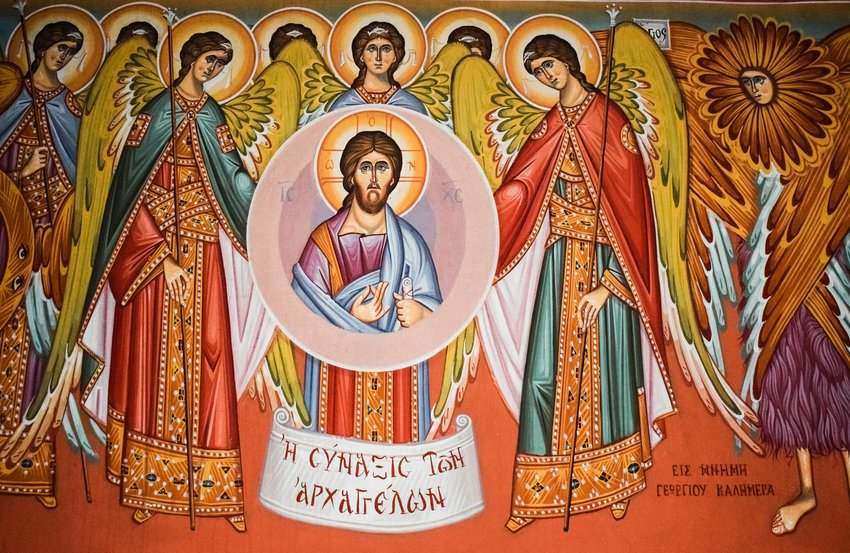




Glory to God, the LORD of Hosts. Hallelujah Amen.
Amen!
Do you mind if I ask you a question on Galatians 1:9 and brothers of the Lord I read something on it that bothered me do you mind if I ask you
Sure. I’d be happy to help any way that I can.
Man I sent you an email to respond to some Jesus mystic could you respond to his claims on Galatians 1:9 I just sent you the email